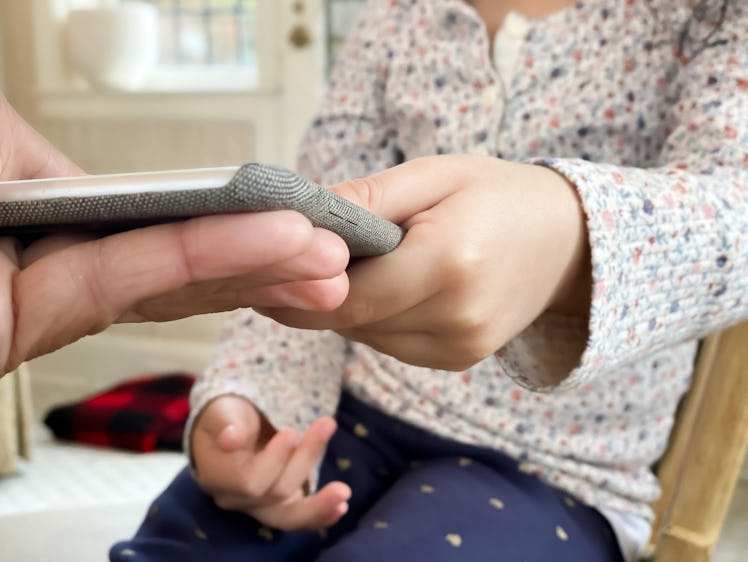New Study Says You Should Never Calm Your Kid Down By Handing Them A Phone
Just don’t do it.

While most parents are familiar with the term “cry it out” as it pertains to sleep training, a new study published in JAMA Pediatrics may have parents considering the mantra for their fussy preschoolers. The Michigan Medicine study indicates that using screens to buy some peace and quiet when preschoolers are upset can backfire down the road, giving parents pause to consider how to respond when they just can’t get their kid to settle down.
For the study, researchers followed 422 typically developing children aged 3 to 5 years for six months to gather data points on how using screens to calm agitated kids affected their ability to regulate emotions. After gathering a baseline for each participant, researchers followed up three months later and then again six months after the initial assessment.
Not only did findings suggest associations between increased emotional dysregulation and the frequent use of devices like smartphones and tablets to calm upset kids, but they also found that the association between device-calming and emotional consequences was even higher for boys and kids who were predisposed to hyperactivity, impulsivity, and intense reactions to feelings like frustration, sadness, and anger.
"Our findings suggest that using devices as a way to appease agitated children may especially be problematic to those who already struggle with emotional coping skills," lead author Jenny Radesky, M.D., said in a release.
In a way, preschool-aged children are wired to throw temper tantrums or otherwise become emotionally dysregulated. The neuroscientific explanation is that their underdeveloped prefrontal cortex prevents them from keeping their limbic system in check. Or, to put it simply, their brains are still developing the ability to stay calm over issues that might otherwise seem trivial to adults.
Radesky is sympathetic to the fact that parents would instinctively reach for tools like cell phones and tablets in all-too-frequent moments of volatility from their kids. But doing so starts a pattern that isn’t beneficial for anyone over time.
"Caregivers may experience immediate relief from using devices if they quickly and effectively reduce children's negative and challenging behaviors," Radesky says. "This feels rewarding to both parents and children and can motivate them both to maintain this cycle.
"The habit of using devices to manage difficult behavior strengthens over time as children's media demands strengthen as well. The more often devices are used, the less practice children — and their parents — get to use other coping strategies."
Fortunately, there are methods other than screen time to survive tantrums. Understanding why preschoolers get agitated, maintaining realistic expectations about tantrums, and having a toolbox of skills to help calmly stop tantrums, and even reading books to kids that help them understand their intense feelings are all parts of the puzzle. While not as effortless as handing them a device, these long-term strategies can help caregivers make the most out of opportunities to teach young kids emotional coping skills.
This is not to say parents should never break out a screen when their kid is losing it. Desperate times call for desperate measures. Just don’t make it a habit that no one will be able to break.